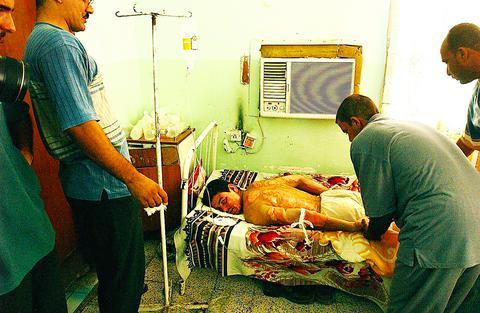Insurgents killed seven Iraqi security personnel in a car bombing and other attacks, and the US military announced the deaths of six Americans, including four killed by guerrillas.
The American dead included two soldiers killed by a roadside bomb on Tuesday and two Marines who died after being wounded in fighting the day before. Two others died in non-combat-related incidents. The US deaths brought the number of US service members who have died since the beginning of military operations in Iraq to at least 919.

PHOTO: EPA
Also Tuesday, saboteurs set off a bomb at a key northern oil pipeline, sparking a fire and sending huge plumes of thick black smoke into the sky. The explosion had no immediate effect on exports, which had been halted for weeks from the north.
Iraqi Prime Minister Ayad Allawi blamed the continuing violence on "evil powers ... trying to stop Iraq's march toward safety."
"We expect that as Iraq's [security] capabilities increase, the crushing of these [armed] operations will increase,'' he said Tuesday.
In the city of Najaf, south of Baghdad, forces loyal to radical Shiite cleric Muqtada al-Sadr were holding 18 police hostage as leverage to force authorities to release their comrades, a police official said Tuesday on condition of anonymity.
The abductions reflected increasing friction that has threatened a fragile truce that ended two months of fighting that began in April between al-Sadr's Mahdi Army militia and US troops. Marines and al-Sadr's militiamen engaged in a battle in Najaf on Monday that killed a woman.
Al-Sadr aides have accused police of targeting members of his Mahdi Army.
Najaf Governor Adnan al-Zurufi confirmed that a number of policemen were kidnapped; Ahmed al-Shaibany, an al-Sadr spokesman, denied any police were locked up in al-Sadr's office or any of his quarters.
The deadliest insurgent attack on Tuesday came in a car bombing north of the city of Baqoubah, when a truck raced toward an Iraqi checkpoint guarding Kharnabad Bridge, officials said.
The truck attempted to merge into a US military convoy heading toward the bridge, but a soldier driving one of the vehicles forced it off the road before it detonated, said Major Neal O'Brien, a US Army spokesman. No US troops were injured, he said.
The blast killed four members of the Iraqi National Guard and wounded five others, said Major-General Waleed Khaled Abdulsalam, Baqouba's police chief.
"A US convoy drove past us and just afterward there was an explosion,'" Corporal Motaz Abood, whose back, arms and face were covered in burns, said from his hospital bed.
In other violence, a roadside bomb attack early Tuesday killed Colonel Mouyad Mohammed Bashar, chief of al-Mamoun police station in Baghdad, along with another officer, officials said. A third officer was wounded in the blast.
Gunmen in the northern city of Mosul opened fire on a police station, killing one officer and injuring two others before fleeing, police chief Izzat Ibrahim said.
The pipeline attack came when saboteurs exploded a bomb on Tuesday alongside a pipeline that sends oil to Iraq's Beiji refinery as well as to Turkish port of Ceyhan, the main export line from Iraq's northern oil fields. The Ceyhan pipeline already has been idle for weeks due to constant attacks.

A fire caused by a burst gas pipe yesterday spread to several homes and sent a fireball soaring into the sky outside Malaysia’s largest city, injuring more than 100 people. The towering inferno near a gas station in Putra Heights outside Kuala Lumpur was visible for kilometers and lasted for several hours. It happened during a public holiday as Muslims, who are the majority in Malaysia, celebrate the second day of Eid al-Fitr. National oil company Petronas said the fire started at one of its gas pipelines at 8:10am and the affected pipeline was later isolated. Disaster management officials said shutting the

US Vice President J.D. Vance on Friday accused Denmark of not having done enough to protect Greenland, when he visited the strategically placed and resource-rich Danish territory coveted by US President Donald Trump. Vance made his comment during a trip to the Pituffik Space Base in northwestern Greenland, a visit viewed by Copenhagen and Nuuk as a provocation. “Our message to Denmark is very simple: You have not done a good job by the people of Greenland,” Vance told a news conference. “You have under-invested in the people of Greenland, and you have under-invested in the security architecture of this

Japan unveiled a plan on Thursday to evacuate around 120,000 residents and tourists from its southern islets near Taiwan within six days in the event of an “emergency”. The plan was put together as “the security situation surrounding our nation grows severe” and with an “emergency” in mind, the government’s crisis management office said. Exactly what that emergency might be was left unspecified in the plan but it envisages the evacuation of around 120,000 people in five Japanese islets close to Taiwan. China claims Taiwan as part of its territory and has stepped up military pressure in recent years, including

UNREST: The authorities in Turkey arrested 13 Turkish journalists in five days, deported a BBC correspondent and on Thursday arrested a reporter from Sweden Waving flags and chanting slogans, many hundreds of thousands of anti-government demonstrators on Saturday rallied in Istanbul, Turkey, in defence of democracy after the arrest of Istanbul Mayor Ekrem Imamoglu which sparked Turkey’s worst street unrest in more than a decade. Under a cloudless blue sky, vast crowds gathered in Maltepe on the Asian side of Turkey’s biggest city on the eve of the Eid al-Fitr celebration which started yesterday, marking the end of Ramadan. Ozgur Ozel, chairman of the main opposition Republican People’s Party (CHP), which organized the rally, said there were 2.2 million people in the crowd, but